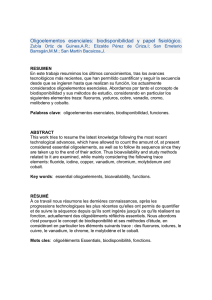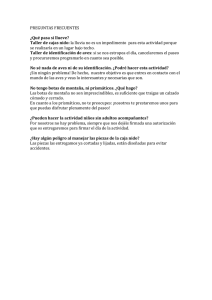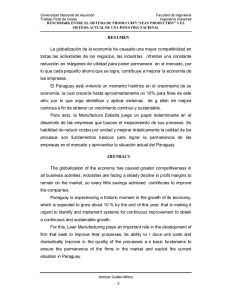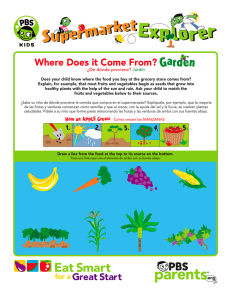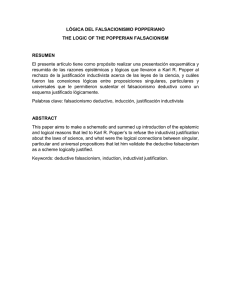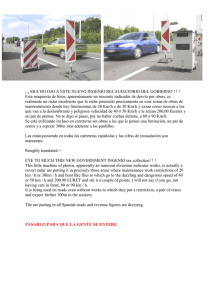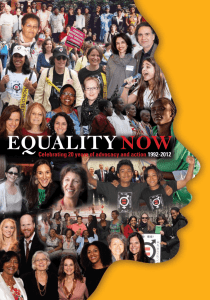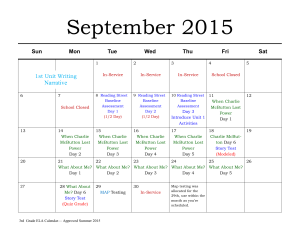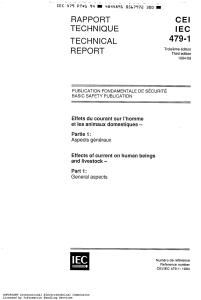2015 Rio Conventions Les Conventions de Rio Las Convenciones
Anuncio
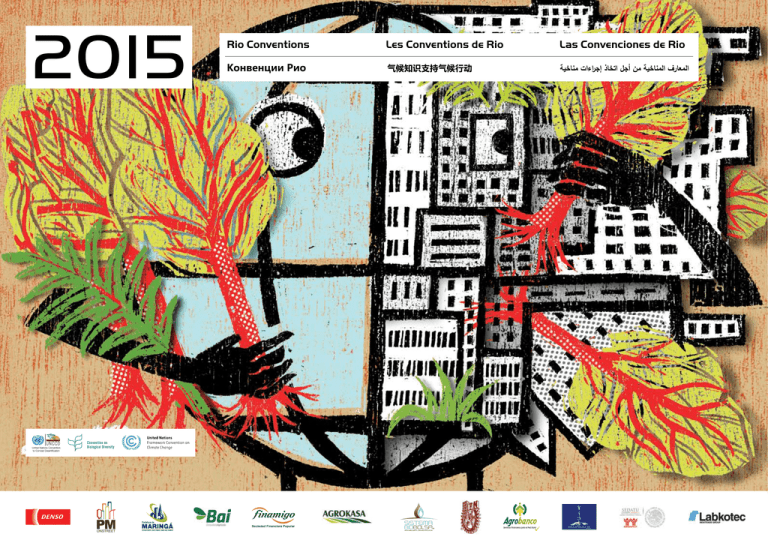
2015 Rio Conventions Les Conventions de Rio Las Convenciones de Rio Конвенции Рио 气候知识支持气候行动 المعارف المناخية من أجل اتخاذ إجراءات مناخية UN RIO CONVENTIONS CALENDAR 2015 ILLUSTRATIONS © DANIEL PUDLES | www.daniel.pudles.co.uk Daniel Pudles is an award winning illustrator based in Brussels since 2004. Born in Paris, he studied typography, illustration and photography at the Ecole Supérieure d’Arts Graphiques (ESAG) and then Latin calligraphy. He worked mainly producing experimental animations for CD-ROMS before moving to London in 1993 where his career as a traditional illustrator took off. He works mainly for the British press such as The Guardian, The Economist, The Financial Times, Around the Globe (Shakespeare’s Globe magazine) and French publisher Editions du Seuil. His artwork is based on prints from woodcuts digitally optimized. FOREWORD THE RIO CONVENTIONS FOR SUSTAINABLE DEVELOPMENT CONVENCIONES DE RÍO PARA EL DESARROLLO SOSTENIBLE LES CONVENTIONS DE RIO EN VUE D’UN DÉVELOPPEMENT DURABLE Peace. Prosperity. Opportunity. For many of our fellow citizens these are distant dreams. Aspirations that hang in the balance, depending not just on their own hard work but a multitude of environmental, social and economic conditions. The cotton farmers in Burkina Faso, the Inuit fishing communities in the Arctic and the isolated Amazon tribes all rely on nature to provide. So too do the hedge fund managers in London, the oil traders in New York and the coal miners in Australia. No-one has a free pass. Paz. Prosperidad. Oportunidad. Para muchos de nuestros conciudadanos son sueños lejanos, aspiraciones que penden de un hilo y no dependen simplemente de su propio esfuerzo, sino de infinidad de condiciones ambientales, sociales y económicas. Los productores de algodón en Burkina Faso, las comunidades de pescadores Inuit del Ártico y las tribus amazónicas aisladas dependen de lo que la naturaleza les proporciona. Lo mismo sucede con los gestores de fondos de inversión libre en Londres, las empresas del sector petrolero y las de la minería del carbón en Australia. Nadie tiene pase libre. Paix. Prospérité. Opportunité. Pour nombre de nos concitoyens, il s’agit là de rêves lointains. Des aspirations pèsent sur la balance, qui dépendent non seulement de leur dur labeur, mais aussi d’une multitude de conditions environnementales, économiques et sociales. Les cultivateurs de coton du Burkina Faso, les pêcheurs inuit de l’Arctique et les tribus isolées d’Amazonie dépendent tous de la générosité de la nature. Il en va de même des administrateurs de sociétés d’investissement de Londres, des traders en pétrole de New York et des ouvriers des mines de charbon d’Australie. Personne n’a de laissez-passer gratuit. The next 12 months will go some way to determining how committed all nations are to achieving a cleaner, healthier and fairer world. In centuries to come, 2015 may be looked back on as a year when those dreams started to become reality. At the centre of this quest for a new, sustainable form of development, lie the three Rio Conventions, born in 1992 and now, 23 years later, delivering a passport for change. Los próximos 12 meses contribuirán de alguna manera a determinar el grado de compromiso de todas las naciones con el objetivo de conseguir un mundo más limpio, más saludable y más justo. Puede que en siglos venideros, al echar la vista atrás, se considere que 2015 fue el año en que esos sueños comenzaron a hacerse realidad. En el centro de esta búsqueda de una nueva forma de desarrollo sostenible se encuentran las tres convenciones de Río, que nacieron en 1992 y ahora, 23 años más tarde, nos ofrecen un pasaporte para el cambio. Les 12 mois à venir vont contribuer à déterminer l’engagement des nations à créer un monde plus propre, plus sain et plus juste. Lors des siècles à venir, on se souviendra peut-être de 2015 comme d’une année où ces rêves auront commencé à devenir réalité. Au centre de cette quête d’une forme nouvelle et viable de développement se trouvent les trois conventions de Rio, qui ont vu le jour en 1992 et qui maintenant, 23 ans plus tard, offrent un passeport pour le changement. Climate change, desertification, biodiversity lie at the nexus of international efforts to change the system. To quote United Nations Secretary-General, Ban Ki-moon: “For most of the last century, economic growth was fuelled by what seemed to be a certain truth: the abundance of natural resources. We mined our way to growth. We burned our way to prosperity. We believed in consumption without consequences. Those days are gone.” That was the vision. 2015 is a year for delivery, spearheaded by the Conventions to combat land degradation, address climate change and sustain biodiversity. Next December in Paris, nearly 200 countries will come together to sign a new agreement on limiting global warming. Sending a message to the United Nations Climate Summit in September 2014, more than 300,000 people marched for climate action in New York together with citizens in more than 2,000 locations worldwide, while heads of state and business leaders pledged their support for new carbon curbing regulations. Momentum is building. We are building towards a food and water secure future, resilient to climate change. By tackling land and soil degradation, we will stop the loss of vital resources. Costing us US$490 billion a year; land degradation affects everyone. We all have an interest in doing something practical about it. Adopting a target of Land Degradation Neutrality at all levels would be a clear sign that, in 2015, we are finally recognising the value of land to our future security and prosperity. Efforts to protect the Earth’s priceless biodiversity and ecosystem functions and services will also be enhanced, as the Strategic Plan for Biodiversity 2011-2020 hits its halfway stage. Meeting the Aichi Biodiversity Targets would contribute significantly to broader global priorities addressed by the post-2015 development agenda; namely, reducing hunger and poverty, improving human health, and ensuring a sustainable supply of energy, food and clean water. Incorporating biodiversity into the sustainable development goals, currently under discussion, provides an opportunity to bring biodiversity into the mainstream of decision making. Underpinning all of these efforts will be the new set of sustainable development goals, scheduled to be agreed in New York in 2015 by the United Nations General Assembly. Based on the outcome document of the 2012 Rio+20 Conference, The future we want, these will set the green growth agenda for the next fifteen years. At their heart will be a new manifesto to eradicate poverty, build a shared prosperity, combat climate change and promote the conservation and sustainable use of our land and seas. Time is running out, but together we can all make a difference. Recall the wise words of Indira Gandhi as she addressed the 1972 United Nations Conference on the Human Environment in Stockholm: “We see that however much man hankers after material goods, they can never give him full satisfaction. Thus the higher standard of living must be achieved without alienating people from their heritage and without despoiling nature of its beauty, freshness and purity so essential to our lives.” Published by Entico Corporation Ltd 19 Heddon Street, First Floor, London W1B 4BG, United Kingdom Tel: +44 (0) 20 7799 2222 | Email: [email protected] | www.entico.com No part of this publication may be reproduced without the written consent of the publisher. Opinions expressed in this publication are not necessarily those of the publisher. Whilst every effort is made to ensure accuracy, we at Entico Corporation Limited cannot take responsibility for losses resulting from publishing errors, however caused. © 2014 Entico Corporation Limited and the visual authors Designed by UBU DESIGN - www.ubudesign.co.uk The secretariats of the CBD, UNFCCC and UNCCD do not represent or endorse the accuracy or reliability of the information presented concerning the photographs. The designations employed and the presentation of material do not imply the expression of any opinion whatsoever on the part of the secretariats of the CBD, UNFCCC and UNCCD concerning the legal status of any country, territory, city or area or of its authorities, or concerning the delimitation of its frontiers or boundaries. El cambio climático, la desertificación y la diversidad biológica se encuentran en el nexo de los esfuerzos internacionales por cambiar el sistema. En palabras del secretario general de las Naciones Unidas Ban Ki-moon: «Durante la mayor parte del siglo pasado, el crecimiento económico fue impulsado por lo que parecía ser una verdad infalible: la abundancia de recursos naturales. Crecimos a golpe de mina. Prosperamos a golpe de combustibles de origen fósil. Creíamos en el consumo sin consecuencias. Eso se ha acabado». Esa era la visión. 2015 es un año de resultados concretos, encabezados por las convenciones para luchar contra la degradación de las tierras, abordar el cambio climático y mantener la diversidad biológica. El próximo mes de diciembre cerca de 200 países se reunirán en París con el propósito de firmar un nuevo acuerdo para limitar el calentamiento global. Más de 300 000 personas participaron en una marcha ciudadana a favor de actuar frente al cambio climático que se organizó en Nueva York y en más de 2000 ciudades de todo el mundo para lanzar un mensaje a la Cumbre de las Naciones Unidas sobre el Clima que se celebró en septiembre de 2014, donde jefes de estado y líderes del sector empresarial se comprometieron a apoyar nuevos reglamentos que contribuyan a contener las emisiones de carbono. Se está generando impulso. Estamos preparando un futuro con seguridad alimentaria e hídrica, capaz de recuperarse de los efectos del cambio climático. Al abordar la degradación de las tierras y del suelo, vamos a detener la pérdida de recursos vitales. La degradación de la tierra nos afecta a todos, y nos cuesta 490 000 millones de USD al año. A todos nos interesa hacer algo práctico al respecto. Tener como objetivo un mundo con efecto neutro en la degradación de las tierras en todos los niveles sería una clara señal de que en 2015 por fin estamos reconociendo el valor de la tierra para nuestra seguridad y prosperidad futuras. Con la llegada del Plan Estratégico para la Diversidad Biológica 2011-2020 a su ecuador, también se intensificarán los esfuerzos por proteger la diversidad biológica y los servicios y funciones de los ecosistemas, de valor incalculable. Alcanzar las Metas de Aichi para la Diversidad Biológica contribuiría de manera significativa a prioridades globales más amplias que son abordadas en la agenda para el desarrollo después de 2015, a saber, reducir el hambre y la pobreza, mejorar la salud humana y asegurar un suministro sostenible de energía, alimentos y agua potable. La incorporación de la diversidad biológica a los objetivos de desarrollo sostenible, actualmente en debate, nos brinda una oportunidad para integrar dicha diversidad en la corriente principal de la toma de decisiones. Todos estos esfuerzos se fundamentarán en el nuevo conjunto de objetivos de desarrollo sostenible que la Asamblea General de las Naciones Unidas acordará en Nueva York en 2015. Basados en el documento final de la Conferencia Río+20 de 2012, El futuro que queremos, estos objetivos establecerán la agenda de crecimiento verde para los próximos quince años. En el centro habrá un nuevo manifiesto para erradicar la pobreza, generar una prosperidad compartida, combatir el cambio climático y promover la conservación y utilización sostenible de nuestra tierra y nuestros mares. Se nos está acabando el tiempo, pero juntos podemos cambiar las cosas. Recordemos las sabias palabras de Indira Gandhi en la Conferencia de las Naciones Unidas sobre el Medio Humano que se celebró en Estocolmo en 1972: «Vemos que por mucho que el hombre ansíe bienes materiales, estos nunca pueden satisfacerle plenamente. Por tanto hay que mejorar el nivel de vida sin privar a la gente de su patrimonio y sin despojar a la naturaleza de su belleza, su frescura y su pureza, tan esenciales para nuestras vidas». Carbon Clear is a carbon management company that works with businesses to measure their carbon footprint, produce standards-compliant carbon reports, develop in-house reduction strategies and source high quality carbon offset projects. Our team of carbon management specialists work with your organisation to tailor a carbon management plan for your needs. We source carbon credits from compliance markets or from our own portfolio. All of the projects Carbon Clear invests in are selected based on both carbon reduction and a wider social benefit for the communities implementing them. A great deal of care is taken to ensure money is directed to activities that genuinely improve the environment and the lives of real people and all projects must meet the following criteria: • Projects must be efficient; funds are not diverted to unnecessary bureaucratic overheads, waste or middlemen • Projects must have additional, long-term benefits to the communities that undertake them; these range from job creation to protecting endangered plants and animals • Projects should follow the spirit of the Kyoto agreement; projects must make verifiable pollution reductions over and above their normal level. Carbon Clear is proud to have offset the emissions associated with production and distribution of this project. www.carbon-clear.com Les changements climatiques, la désertification et la biodiversité se trouvent au centre d’efforts internationaux pour changer le système. Pour citer M. Ban Ki-moon, Secrétaire général des Nations Unies: «Pendant la plus grande partie du siècle dernier, la croissance économique a été alimentée par ce qui semblait être une certaine vérité: l’abondance des ressources naturelles. Nous avons miné la voie de la croissance. Nous avons brûlé la voie de la prospérité. Nous avons cru à la consommation sans conséquences. Ces jours appartiennent désormais au passé.» C’était là la vision. 2015 est une année de délivrance, menée par les conventions sur la lutte contre la dégradation des sols et les changements climatiques et sur le soutien à la biodiversité. En décembre prochain, à Paris, près de 200 pays vont se réunir pour signer un nouvel accord sur la limitation du réchauffement mondial. En septembre 2014, plus de 300 000 personnes ont transmis un message au Sommet de l’ONU sur le climat en organisant à New York une marche en faveur de l’action pour le climat avec des représentants de plus de 2 000 localités dans le monde alors que des chefs d’État et des dirigeants d’entreprises accordaient leur soutien à une nouvelle réglementation sur la limitation du carbone. Le mouvement prend maintenant de l’ampleur. Nous nous dirigeons vers un avenir résistant aux changements climatiques où sera assurée la sécurité de l’eau et de l’alimentation. Nous allons mettre fin à la perte de ressources vitales en nous attaquant à la dégradation des sols. Celle-ci nous coûte 490 milliards de dollars É.-U. par an et touche tout le monde. Nous avons tous intérêt à agir de façon pratique à ce propos. L’adoption d’un objectif visant la neutralité de la dégradation des sols à tous les niveaux serait un signe manifeste qu’en 2015, nous reconnaîtrons enfin la valeur de la terre pour notre sécurité et notre prospérité à venir. Alors que le Plan stratégique 2011-2020 pour la diversité biologique arrive à mi-parcours, les efforts pour protéger la biodiversité d’une valeur estimable et les fonctions et services des écosystèmes de la Terre seront multipliés. Le fait d’atteindre les objectifs d’Aichi pour la biodiversité contribuerait sensiblement à la mise en place de priorités mondiales plus vastes définies dans le programme de développement pour l’après-2015: réduction de la faim et de la pauvreté, amélioration de la santé et garantie d’un approvisionnement durable en énergie, en nourriture et en eau propre. En intégrant la biodiversité dans les objectifs d’un développement durable, actuellement en négociation, on aurait la possibilité de l’insérer dans le courant dominant de la prise de décisions. Une nouvelle série d’objectifs en matière de développement durable, qui doivent être convenus à New York en 2015 par l’Assemblée générale des Nations Unies, étayent tous ces efforts. Fondés sur le document résultant de la conférence Rio + 20, L’avenir que nous voulons, ces objectifs vont déterminer l’agenda de la croissance verte pour les 15 années à venir. En leur cœur se trouvera un nouveau manifeste sur l’élimination de la pauvreté, la création d’une prospérité collective, la lutte contre les changements climatiques et la promotion de la conservation et de l’exploitation durable de la terre et de la mer. Il ne reste plus beaucoup de temps, mais tous unis, nous pouvons faire avancer les choses. Rappelons-nous les sages paroles d’Indira Gandhi lorsqu’elle s’exprimait lors de la Conférence des Nations Unies de 1972 sur l’environnement humain, à Stockholm: «Nous constatons que pour autant que l’homme rêve de biens matériels, ceux-ci ne lui donneront jamais pleinement satisfaction. Ainsi, nous devons atteindre un niveau de vie plus élevé sans aliéner les populations de leur patrimoine et sans spolier la nature de sa beauté, de sa fraîcheur et de se pureté, tellement essentielles à nos vies.» Polestar Stones has focused on top-level customer service, leading-edge technology and award winning quality for nearly 200 years. Today it is seen as the industry leader. Thriving in the competitive commercial and publications markets, Polestar Stones is among the most sophisticated sheet-fed printers in the UK. Through continued investment we have focused on delivering top-quality magazines, directories and catalogues, as well as increasing our market share in the commercial and financial sectors. Relationships and teamwork develop from good experiences and Polestar Stones’ impressive and extensive client portfolio is testimony to our professionalism. One of our longest clients, The National Gallery, placed its first job way back in the 1970’s. With one of the most well equipped B1 printing houses in the Country, including two cut star and two sheet fed long perfectors, Polestar Stones has the flexibility to meet tight deadlines and help our clients with streamlined work flow to cut time and cost through efficient production. Our finishing department is extensive offering perfect binding, high speed saddle stitching, scoring, creasing, folding, trimming, UV varnishing, laminating, collating, numbering, gumming, packing and despatch. Professional account management, creative services, and mailing and distribution further support our printing/finishing capability. www.polestar-group.com JANUARY 2015 MON TUE WED THU SUSTAINABLE USE OF MARINE RESOURCES Overfishing and pollution represent clear threats to marine biodiversity and the ability of oceans provide a long-term source of food for humans. Conserving marine ecosystems, ending overfishing and preventing marine pollution from land-based activities are key to sustainable development. FRI SAT SUN 293031 1 2 34 5678910 11 12 13 14 15 16 17 18 19 20 21 22 23 24 25 26 27 28 29 30 31 1 FEBRUARY 2015 THU CONTROL OVER ATMOSPHERIC POLLUTION Greenhouse gases released from power plants and vehicles account for over 40% of global emissions, a figure that is rising. Carbon capture, efficiency measures and electric cars can go some way to curbing pollution levels. MON TUE WED FRI SAT SUN 26 27 28 293031 1 2 3 4 5 6 7 8 9 10 11 12 13 14 15 16 17 18 19 20 21 22 23 24 25 26 27 28 1 MARCH 2015 PROVIDING CLEAN WATER Nearly 800 million people lack clean water, while 85% of the world lives in the driest half of the planet. Achieving universal and equitable access to safe and affordable drinking water for all is essential for sustainable development. MON TUE WED THU FRI SAT SUN 23 24 25 26 27 28 1 2 3 4 5 6 7 8 9 10 11 12 13 14 15 16 17 18 19 20 21 22 23 24 25 26 27 28 29 30 31 1 2345 APRIL 2015 SLOWING RATES OF DEFORESTATION Forests are valuable reservoirs of biodiversity, regulate rainfall and store vast quantities of carbon dioxide. The destruction of the world’s forests makes curbing greenhouse gas emissions far harder and leads to the loss of rare and precious flora and fauna and loss of human livelihoods. MON TUE WED THU FRI SAT SUN 30 31 1 2 3 45 6 7 8 9 10 11 12 13 14 15 16 17 18 19 20 21 22 23 24 25 26 27 28 29 30 1 23 MAY 2015 CLEAN ELECTRICITY FOR ALL Millions still live below the poverty line and without access to electricity. The UN’s Sustainable Energy For All aims to connect everyone to power grids using clean energy by 2030. MON TUE WED THU FRI SAT SUN 27 28 29 30 1 23 4 5 6 7 8 9 10 11 12 13 14 15 16 17 18 19 20 21 22 23 24 30 31 INTERNATIONAL DAY FOR BIOLOGICAL DIVERSITY 25 26 27 28 29 JUNE 2015 MON TUE WED CAREFUL LAND MANAGEMENT Nearly 170 countries now suffer from various forms of land degradation and desertification. Agroforestry and climate smart agriculture can help protect valuable ecosystems, ensure they remain fertile for crops and make the land more resilient to floods or drought. THU FRI SAT SUN 1 2 34 5 67 WORLD ENVIRONMENT DAY 8 9 10 11 12 13 14 15 16 17 18 19 20 21 25 26 27 28 WORLD DAY TO COMBAT DESERTIFICATION 22 23 24 29 30 1 2 3 45 JULY 2015 ‘GREENING’ URBAN ENVIRONMENTS Nearly 70% of people are expected to live in cities by 2050. These vast urban areas will need to be better able to adapt to changing weather conditions, use energy more effectively and transport people in ways that minimises pollution and congestion. MON TUE WED THU FRI SAT SUN 29 30 1 2 3 45 6 7 8 9 10 11 12 13 14 15 16 17 18 19 20 21 22 23 24 25 26 27 28 29 30 31 12 AUGUST 2015 CLEAN TRANSPORT Electric cars, bicycles and more efficient public transport networks can play an important role in cutting pollution from cars and lorries, and making cities healthier places to live in. MON TUE WED THU FRI SAT SUN 27 28 29 30 31 12 3 4 5 6 7 8 9 10 11 12 13 14 15 16 17 18 19 20 21 22 23 24 25 26 27 28 29 30 31 1 2 3456 SEPTEMBER 2015 WED THU PROTECTING ENDANGERED SPECIES When the death rate of an animal species, through hunting or poaching, exceeds the birth rate, the population size will reduce quickly and the species can become endangered, or even driven to extinction. MON TUE FRI SAT SUN 31 1 2 34 5 6 7 8 9 10 11 12 13 14 15 16 17 18 19 20 21 22 23 24 25 26 27 28 29 30 12 34 OCTOBER 2015 GENDER EQUALITY Women and children are often the most vulnerable to the effects of environmental degradation – but can also offer some of the most effective solutions. Essential among goals for sustainable development will be the achievement of gender equality and empowerment of all women and girls. MON TUE WED THU FRI SAT SUN 28 29 30 12 34 5 6 7 8 9 10 11 12 13 14 15 16 17 18 19 20 21 22 23 24 25 26 27 28 29 30 31 1 NOVEMBER 2015 CLIMATE RESILIENCE Climate change will bring testing weather conditions, but cities and countries can prepare for the worst. Resilient infrastructure, including natural infrastructure and nature-based solutions, designed to withstand tough conditions, use energy efficiently and help manage water will be needed over the next century. MON TUE WED THU FRI SAT SUN 26 27 28 29 30 31 1 2 3 4 5 6 7 8 9 10 11 12 13 14 15 16 17 18 19 20 21 22 23 24 25 26 27 28 29 30 1 2 3456 DECEMBER 2015 WED THU UN CLIMATE DEAL In December nearly 200 countries will gather in Paris for a two-week climate summit, where they are expected to agree a deal to limit global warming to below 2C. MON TUE FRI SAT SUN 30 1 2 34 5 6 7 8 9 10 11 12 13 14 15 16 17 18 19 20 21 22 23 24 25 26 27 28 29 30 31 1 23 UN RIO CALENDAR SPONSORS 2015 DENS0 PM ON STREET AGUA DE MANANTIAL VIS BAI CONSULTORIA AGRICOLA FINAMIGO AGROKASA There are more than 950 million vehicles running worldwide today, and this number is still increasing, unstoppable every year. As we consider this huge amount we could easily see the automotive industry and transport as a major pollutant of the environment and a notable contributor to the global warming. Is this fact inevitable? DENSO thinks it is not. We are a Mexican company that sells outdoor advertising street booths, inspired by an environment of Corporate Social Responsibility. We believe deeply in respecting all ethical business values in order to continue to strive in this business. PEOPLE, PROFIT and PLANET are our three main keys to success. Vis Water is the natural power to heal. This is only possible by assuming all the environmental responsibilities, including the full protection of the ecosystem that surrounds our spring. Vis promotes and respects human rights and includes recyclable material during the process of bringing high quality water as a product qualified to fulfill highest international standards. Bai is a Mexican organization that promotes an agricultural production system based on sustainable technologies, aiming to produce healthy food for the people without pesticides. Our model gives concrete solutions that allow harvest efficiency contributing with an economic and social growth in parallel with a reduction on the carbon footprint. Finamigo is an eleven year old Regulated Microfinance Institution that offers financial services to the unbanked in rural and suburban México. Our financial services are complementary to the financial and economical activities of our clients, all productive self employed Mexicans with different activities from artesanal, transportation, manufacture, bakery, agribusiness and food services. We offer loans, savings, remittances and micro insurance. As the world’s population doubled to more than 7.2 billion between 1960 and 2013, the pressure over natural ecosystems has multiplied. To produce a greater volume of food utilizing less natural resources, maintaining biologic corridors, reducing water and energy consumption, is to move towards a healthy agriculture. This is Agrokasa’s commitment. www.globaldenso.com www.pmonstreet.com www.vis.mx www.baiconsultoria.com www.agroindustriasdelnorte.com www.finamigo.com.mx www.agrokasa.com SISTEMA BIOBOLSA IPN AGROBANCO MARINGÁ SEDATU / INFONAVIT LABKOTEC We develop complete regional and national biogas programs based on our high quality pre-fabricated biodigester system that allows small farmers to convert animal manure and other organic wastes into renewable energy and organic fertilizer. Sistema Biobolsa aims to improve the economic viability, environmental sustainability and wellbeing of small farmers while reducing greenhouse gas emissions. The IPN is the State free education institution, guide of technological education in Mexico, leader in the generation, application, dissemination and transfer of scientific and technological knowledge. Founded to contribute to the economic, social and political development of Mexico, it educates professionals in highschool, graduate and post-graduate studies, conducts research and extends its results to society. AGROBANCO is the main vehicle of the Peruvian State for financial inclusion. It is committed to become a Green and Ethical bank to contribute to the sustainability of its business model, whereby it supports farmers in managing their risks and increase their productivity. A city planned, organized, with abundant tree cover, with the best indices in quality of life, that preserves development at high levels and driving the economy. Maringá has the 23rd HDI and was recently considered the 15th best city to invest in Brazil. It is also among the 50 best cities to live, according to the UN, and among the 500 most developed in Brazil. Urban areas are important contributors to carbon emissions and are expected to grow with Mexico’s population and urbanization. The primary sources of emissions are electricity and fuel used in buildings. Efficient buildings and municipal services can help mitigate these emissions. The Urban NAMA responds to Mexico’s need to generate ever more efficient residential communities. Labkotec has more than 50 years’ experience in the manufacture of electronic level gauges, alarm devices, ice detection, automation and web-based data transmission. As a technology pioneer in level measurement and detection, Labkotec has provided innovative solutions in a broad range of industrial applications. www.sistemabiobolsa.com www.ipn.mx www.agrobanco.com.pe www.maringa.pr.gov.br www.sedatu.gob.mx portal.infonavit.org.mx www.labkotec.fi/en/
